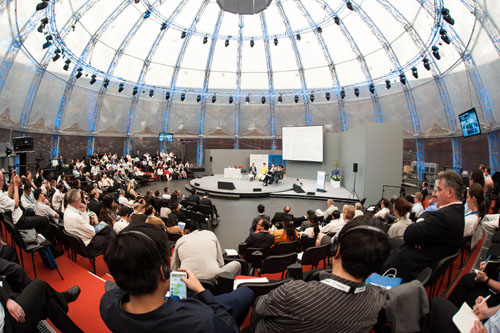Committed to Sustainable Cities and Human Settlements for All
In Special Consultative Status with ECOSOC
Search
Annual2013
-Post Rio+20 Event-
Berlin High-level Dialogue on Implementing Rio+20
Decisions on Sustainable Cities and Urban Transport &
2013 Global Forum on Human Settlements
Time: 19-21 June 2013
Venue: Berlin City Hall – “Rotes Rathaus” (welcome cocktail reception)
Gasometer / EUREF Campus (meetings and exhibition)
Previous
Background
We live in an era of unprecedented, rapid and irreversible urbanization, in particular in the developing world. Rapid private motorization poses growing challenges and problems, including urban congestion, inefficient fuel use and air pollution. Many cities around the world face similar challenges. Making cities and urban transportation systems more sustainable will be a prerequisite for poverty eradication, a “greener” economy and sustainable development.
The United Nations Conference on Sustainable Development (UNCSD), colloquially better known as “Rio+20”, was held in Rio de Janeiro, Brazil, 13-22 June 2012. The Conference was attended by more than 100 Heads of State and Government, and more than 50,000 participants took part in one or more of the many events associated with the Conference. Rio+20 adopted by consensus a comprehensive outcome document under the title “The future we want”, which was subsequently endorsed by the United Nations General Assembly (A/RES/66/288).
Rio+20 noted “that transportation and mobility are central to sustainable development”, and recognized “the importance of the efficient movement of people and goods, and access to environmentally sound, safe and affordable transportation as a means to improve social equity, health, resilience of cities, urban-rural linkages and productivity of rural areas” (§132).
Rio+20 called upon governments to “support the development of sustainable transport systems, including energy efficient multi-modal transport systems, notably public mass transportation systems, clean fuels and vehicles, as well as improved transportation systems in rural areas” (§133).
The Conference emphasized “the important role of municipal governments in setting a vision for sustainable cities, from the initiation of city planning through to revitalization of older cities and neighbourhoods, including by adopting energy efficiency programmes in building management and developing sustainable, locally appropriate transport systems” (§136).
Rio +20 also “recognized that partnerships among cities and communities play an important role in promoting sustainable development”, and stressed “the need to strengthen existing cooperation mechanisms and platforms, partnership arrangements and other implementation tools” (§137).
One of the main outcomes of the Rio+20 Conference was the agreement by member States to launch a process to develop a set of Sustainable Development Goals (SDGs), which will build upon the Millennium Development Goals and converge with the post 2015 development agenda. It was decided to establish an "inclusive and transparent intergovernmental process open to all stakeholders, with a view to developing global sustainable development goals to be agreed by the General Assembly". The Intergovernmental Working Group on the Sustainable Development Goals has recently commenced its work.
With regard to the institutional framework on sustainable development, the Rio+20 Conference decided to replace the UN Commission on Sustainable Development by a High-level Political Forum for Sustainable Development, which is expected to hold its first session at the beginning of the 68th session of the General Assembly (September 2013).
Objectives
Whereas the Rio+20 Conference laid the foundation and charted the overall course for the desirable and needed policy action towards “the future we want”, the challenges ahead lie in rapidly and effectively implementing the above mentioned decisions. Hence, the main objectives of the Berlin High-level Dialogue on Implementing Rio+20 decisions on Sustainable Cities and Urban Transport are to,
a)provide a global forum for international exchange of experiences on urban mobility policies and projects in large cities of both, industrialized and developing countries;
b)highlight proven sustainable urban planning and transport policies and measures, and identify good and best practices in this regard;
c)facilitate capacity building through national and international exchanges of information and experiences among relevant practitioners, experts and policy makers, in particular from developing countries;
d)contribute to the Sustainable Development Goals lunched by the UN and the High-level Political Forum for Sustainable Development;
e)and encourage networking and bi- and multilateral collaboration among leading transport policy makers and senior city administration officials on issues concerning sustainable development of cities, including public health, low-carbon cities ,urban transport and climate change mitigation.
Main Topics
Urban (transport) planning and construction, sustainable transport operation and management, sustainable transport innovation policies and models, industry analysis of EVs position and prospects, popularization and application of EVs technology, sustainable city planning and design, sustainable building, low-carbon scenic spot, renewable energy and smart grids, best practices, etc.
More Highlights
Global Human Settlements Awards Ceremony: The best examples of global sustainable cities, architecture, design, transportation, scenic, etc. will be grandly recognized and awarded, to demonstrate leadership and accelerate the process of sustainable city and human settlements. The “Global Human Settlements Awards”, positioned as “Human Settlements Oscar”, was initiated and issued by Global Forum on Human Settlements (GFHS) and has been successfully held for seven times to date, demonstrating positive effects and huge influence around the world. This one in Berlin will also be issued by Global Forum on Human Settlements (GFHS), supported by United Nations Environment Programme (UNEP) and United Nations Department of Economic and Social Affairs (UNDESA).
GFHS Awards
City: Global Green City
Scenic Spot: Global Low-carbon Ecological Scenic Spots
Real Estate: Global Human Settlements Demonstration Residential Area (Building)
Transport: Global Best Practice of Green Mobility
Designing: Global Human Settlements Award on (Building, Transport, Landscape) Planning and Design
Technology: Global Human Settlements Practice of Green Technology
Individuals: Global Human Settlements Outstanding Contribution Award
(Sino-EU) Electric Vehicles Development Cooperation Dialogue and Technical Seminar: Chinese and German governments have established a strategic cooperation mechanism for cooperation and development of electric vehicles, which will generate enormous opportunities for the electric vehicle and new energy industry. The meeting will discuss the optimization of the cooperation mechanism to strengthen technological exchanges, promotion of product marketing, in order to deal with the various challenges. Participating companies and the governments can take full advantage of the Sino-German platform advantage and edge of this meeting to deepen collaboration and communication and realize mutual benefits.
On-site exhibition and test: Organizers will make full use of the exhibition center in the EUREF Campus, the e-mobility platform in particular, to provide available infrastructure and space for the advanced EVs, sustainable mobility, low-carbon products and innovative business models. Participants, guests, media and potential partners will be able to visit and test the products, which is expected to strengthen cooperation and products marketing.
Capacity building and communication: site-visit to the integrated platform and advanced facility in InnoZ, and experience EVs displayed; visit Berlin Traffic Management Center (VMZ Berlin), Berlin Energy Efficiency Model Home and innovative projects and good practices of sustainable city in Europe.
In addition, 4th meeting of UN Technical Working Group on Sustainable Transport ,Expert Roundtable on Renewable Energy Technologies and Smart Grids, Expert Roundtable on Multimodal Transport Concepts for Cities in Industrialized and in Developing Countries will be concurrently organized by UN agencies and other organizations.
Speakers
High-level officials of the UN and EU, mayors from Berlin and other famous cities, experts and scholar, representatives from international organizations, industry associations and enterprises, etc.
Participants
UN officials, International dignitaries, city government delegations, city planners and designers, representatives of auto and public transport industry, scenic spots groups, , building sectors, environmental protection, renewable energy, private sectors, NGOs, universities, etc.
Berlin: A future capital city of sustainability
Berlin is a world-class city in the continent of Europe with rich history, culture and tourism resources. To build sustainable city, the Government of the State of Berlin, inter alia, committed to
(a) scale up the use renewable energy (incl. through energy storage and smarter grids),
(b) improve energy conservation in retrofitted and “greener” buildings,
(c) re-develop and modernize urban “brownfields”,
(d) establish clean technology business parks,
(e) invest in infrastructure and public transport services, and to facilitate the use of car and bike sharing systems, with a view to attain the following milestones and goals,
(f) by 2020, 10 per cent of vehicles to be electric (including electric bikes),
(g) by 2030, 60 per cent of local electricity (2500 MW) to come from renewable sources,
(h) by 2050, to become a carbon-neutral “Capital of Sustainability”.
Venue(s)
The EUREF Campus, which is the venue of the High-Level Dialogue on 20 June 2013, is in itself an outstanding example and a model for urban modernization and re-development. All facilities on the EUREF Campus are powered exclusively by renewable sources of energy.
The Innovation Center for Mobility and Societal Change (InnoZ), also located on the EUREF Campus, is specialized in qualitative and quantitative analyses of transport, mobility and related areas. Working closely with decision makers from businesses as well as politics and public administrations, InnoZ develop innovative solutions within the field of mobility. The InnoZ is operating the eMobility Platform which includes conference, meeting, and exhibition space. As part of the BeMobility Project, the Platform serves as a central exhibition and testing ground. With financial support of the Federal Ministry of Transport, Building and Urban Development, BeMobility is exploring and testing paths towards the integration of electric cars into public transport systems. The center is hosting an independent large-scale electric mobility demonstration. Electric vehicles and electric bicycles are available and can be tested and used by conference participants.






